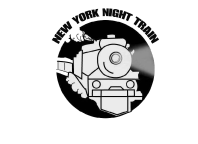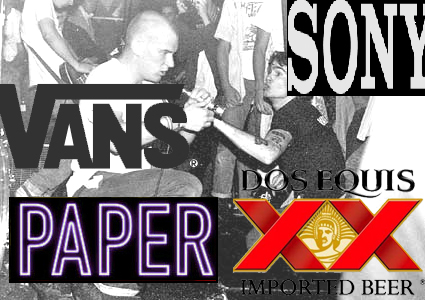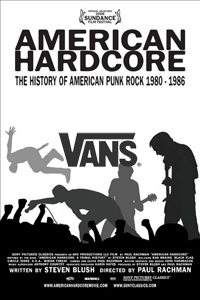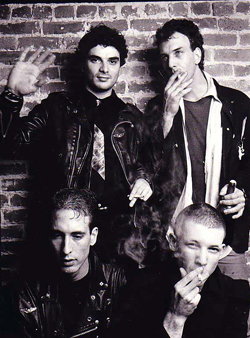
 |
 |
||||||||
| 09:02:2006: Soft Focus, American Hardcore, and Why I'm Not Going
Writer/musician Ian Svenonius of Weird War, Make-Up, Nation of Ulysses, etc., has been in New York of late filming his new talk show, Soft Focus for Vice TV. The last three weeks he’s interviewed Henry Rollins, Ian McKaye, Adrew W.K., Will Oldham, Chan Marshall, and Genesis P. Oridge (seven people I’d love to witness at a dinner party). There’s no music, no backdrop, no nonsense, no corporate product placement or ads on the set. Just a subtle comic light-dimming followed by an in-depth conversation. I hope they don’t over-edit it because this is exactly what the world needs now - not love sweet love, though that’d be nice as well – but something a bit deeper than soundbites.
The hardcore generation, despite its faults, was definitely not doing things to become rich and famous, but anti-rock stars in every sense of the word, even Greg Ginn (I think). Well aware that theirs was not the type of music that ever had a chance on the radio, this small group of folks set up their own universe as an alternative to that of A&R guys, managers, and publicists. And, while more than a few records from the hardcore era hold up, the main thing that survives is not only our touring circuit, or our record store network, but also the seeds they planted within us… That little pang of guilt when we sell out, give in, or merely accept things that we don’t believe in. They offered us a wonderful and uncompromising world, or stand against the predominant world, that, no matter what you hear, is still valid in this age when lines are much blurrier and selling out has become, for most, a necessity. I don’t believe that the DIY values are completely antiquated and am aware of a few circles of young and old folks employing them in various edges of the music world – in basements, warehouses, art galleries, and other makeshift venues, putting out CD-R’s, cassettes, and even 45s. There’s still plenty of music not touched by the entertainment divisions of multinational corporations, Madison Avenue, or even the inflated “indie-music” industry (though sadly, half of the stuff you find here, though indie-ish, is of that lesser evil).
The event was thrown by Paper magazine and sponsored by Dos Equis (they both get a shoutout - promotion is working!) and I arrived just in time to grab a beer and catch the entire set. Flipper was certainly one of the most confrontational and uncompromising bands of their era, and watching these unfashionable, weathered, and very real middle aged men proved they still hadn’t given in more than an inch or two. That night their banter was more concerned with immediate issues: demanding the admittance of a kid who couldn’t get in because he was too young, complaining about the smoking ban, and, when an audience member said, “fuck the hippies,” calling him “ignorant” and taking time to explain that if he had any sense he’d realize the real problem is the corporate fascist state. They even had Moby, who played with them once in the early 1980s, join them on bass for “Sex Bomb,” and then Bruce Loose literally removed the celebrity’s instrument and kicked the him off of the stage – harsh – but still loving in an old school way.
I guess I should just do my duty as a twenty-first century citizen and disembody the moment, leaving it be and merely saying that the band sounded amazing and the beer was fine.... But all of us have that little McKaye on our shoulder telling us it’s all bullshit... Are we supposed grin at the perversity of the fact that Sony Classics is offering us a portrait of an anti-establishment movement? If so, that's the worst kind of cynicism... Before you knock me off of my high Trojan horse (note to media - don't let me in to anything), in the tradition of blind idealism and old-school self-righteousness, let me go on the record as saying, SCREW THAT. I'm refuse. If you really need to find out about hardcore, listen the records instead... Of course I'm a hypocrite in this conversation - the talk show I'm praising will appear on Vice TV and I put Google ads up here to pay a small portion of my expenses... Nonetheless, I don't think the better lessons of the hardcore era, particularly regarding economics and art, are no longer convincing. I still hope we can continue to learn from theIan McKayes, Jello Biafras, Corey Rusks, Calvin Johnsons, or other musicians of the era who took matters into their own hands and refused to compromise - setting their own terms and their own economies, finding alternate paths, and even different destinations. We are still living in the distorted tail of the networks they created and have the power to continue experimenting with their countercultural economic and artistic model if we so desire. It's either that or Mc Nuggets. Maybe it's time we quit being so pragmatic and pick a side once again.
|
 |
||||||||

|
|||||||||



 Which
leads me to my conclusion – a few days after hearing Rollins
and McKaye, I wound up attending the after-premier party for
Which
leads me to my conclusion – a few days after hearing Rollins
and McKaye, I wound up attending the after-premier party for  What
I think the band didn’t know was that, once the American
Hardcore slideshow began to role behind them, it was an endless
loop of about ten frames that degraded the entire experience even
more than the sponsorships, the venue itself, and half of the guests.
The loop started out with a picture of young Rollins, probably circa
1981, stagediving. The next frame was an ad for Vans. The following
frame was SSD Control. Then an ad for Dos Equis. Then an early-1980s
hardcore crowd. Then something involving Sony Pictures and Paper,
etc. Then something involving late-period Black Flag. These ten
or so frames repeated dozens of times throughout the duration of
the set of nihilistic sludge. Though this display could easily be
read as the incongruity between image and sound in the terms of
the Brechtian V-effect - intended to distance the spectator from
the drama, making a statement by pointing out the irony of the contrasting
sound and image, it seemed lost on most of the crowd. I felt like
I was living the conclusion to A Clockwork Orange and these
folks, who just saw an entire movie about an alternate way of living
seemed to be OK with it. A girl who talked to me told me I was being
a downer. I’m sure Flipper had no idea what was happening
behind them, but, as we now write histories that remove the band
and their values from our own time, closing the door on an era,
that moment at whatever the name of the phoney-ass Chelsea nightspot
(no more shout-outs for lameness) spoke volumes about the meaning
that we’re being told to derive from the entire era (or not
derive at this point). And, while Sony may spread the some of the
virus, it's likely that the kid's'll pick up on the violence and
the aesthetics that marked the movement more than the ethos. I left
feeling the inexplicable desire for one more Dos Equis, a copy of
Paper, a pair of Vans, and any thing released by that trusted media
company Sony.
What
I think the band didn’t know was that, once the American
Hardcore slideshow began to role behind them, it was an endless
loop of about ten frames that degraded the entire experience even
more than the sponsorships, the venue itself, and half of the guests.
The loop started out with a picture of young Rollins, probably circa
1981, stagediving. The next frame was an ad for Vans. The following
frame was SSD Control. Then an ad for Dos Equis. Then an early-1980s
hardcore crowd. Then something involving Sony Pictures and Paper,
etc. Then something involving late-period Black Flag. These ten
or so frames repeated dozens of times throughout the duration of
the set of nihilistic sludge. Though this display could easily be
read as the incongruity between image and sound in the terms of
the Brechtian V-effect - intended to distance the spectator from
the drama, making a statement by pointing out the irony of the contrasting
sound and image, it seemed lost on most of the crowd. I felt like
I was living the conclusion to A Clockwork Orange and these
folks, who just saw an entire movie about an alternate way of living
seemed to be OK with it. A girl who talked to me told me I was being
a downer. I’m sure Flipper had no idea what was happening
behind them, but, as we now write histories that remove the band
and their values from our own time, closing the door on an era,
that moment at whatever the name of the phoney-ass Chelsea nightspot
(no more shout-outs for lameness) spoke volumes about the meaning
that we’re being told to derive from the entire era (or not
derive at this point). And, while Sony may spread the some of the
virus, it's likely that the kid's'll pick up on the violence and
the aesthetics that marked the movement more than the ethos. I left
feeling the inexplicable desire for one more Dos Equis, a copy of
Paper, a pair of Vans, and any thing released by that trusted media
company Sony.